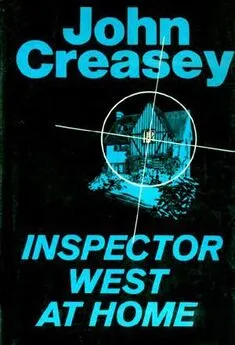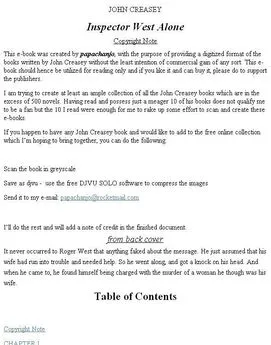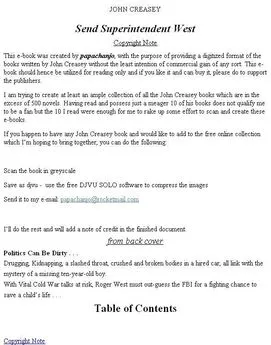John Creasey - Triumph For Inspector West
- Название:Triumph For Inspector West
- Автор:
- Жанр:
- Издательство:неизвестно
- Год:неизвестен
- ISBN:нет данных
- Рейтинг:
- Избранное:Добавить в избранное
-
Отзывы:
-
Ваша оценка:
John Creasey - Triumph For Inspector West краткое содержание
Triumph For Inspector West - читать онлайн бесплатно полную версию (весь текст целиком)
Интервал:
Закладка:
“Bill!” Her voice was loud now.
The rustling sound was much nearer; it seemed to be all round her, but she could see nothing moving. A car went over the bridge, shedding a bright light above her; if only she had stayed nearer the road; if only
A hand clutched her throat!
She screamed.
The cry was cut short as fingers pressed against her windpipe. An arm was flung round her, and she was pressed tightly against her assailant. She could not breathe; she began to struggle against that powerful grip, but when she tried to kick out she lost her balance, made the situation worse.
A great darkness was descending on her with that terrible pressure at her throat. They were going to kill her. She was being murdered.
No, no, no!
The pressure relaxed.
She was a shuddering mass of nerves, and would have fallen but for the support of her assailant. She gasped and panted as the air reached her lungs again. She wanted to scream for help, but little sound came.
A voice whispered close to her ear. She caught only the last two words: “Don’t worry.” She turned and, as she did so,-a cloth was dropped over her head and shoulders; she could feel it on her cheeks and chin, piling terror upon terror. She tried to struggle, but it was drawn tightly about her neck. Then she was lifted clear of the ground, and carried off.
Her assailant carried her for what seemed a long distance. She was able to breathe inside the cloth, but swayed on her feet when at last the man set her down. He still held her, and this time she caught his words clearly.
“If you behave yourself, you’ll be all right. Don’t talk above a whisper.” He had a curiously expressionless voice.
“I won’t, I won’t,” she promised, but the cloth seemed to muffle the words.
The cord at her neck was loosened, and the cloth taken off. It was very dark. In the distance were the lights of the main road, just visible between the trees; so she was still on the Common.
“Go straight ahead,” the man said, pushing her forward. “Go on, they won’t hurt you.”
Something clutched at her clothes; she felt her stocking rip and a sharp pain in her leg. She was being pushed through a gap between some bushes. Then the twigs and thorns stopped tugging at her, and she stood free of them with darkness all round her—alone with the man who had nearly throttled her. If only she could scream!
The man said: “I sent that message, your husband didn’t. Get that clear. Now answer my questions, and keep your voice low. Understand?”
“Ye—yes.”
“You’d better.” A hand gripped her arm tightly enough to make her wince.
“Did the police come to see you today?”
“I—”she faltered.
“Did they?” The grip tightened, painfully.
“Yes.”
“What did they want?”
“They—wanted—to know where my husband was last night.”
“Did you tell them?”
“I didn’t know.”
“You needn’t come that with me! I’m not a rozzer. Did you tell them?”
“No.”
“He was on a job, wasn’t he?”
“I—I think so.”
The man said: “Now listen to me, Katie. I want straight answers. You’re here on the Common alone with me, see? I can do what I like with you. Ever read in the papers of a girl being strangled on a lonely bit of common? That’ll be you if you’re not careful, only you won’t read about it. Give it to me straight, or I’ll fix you. Your husband was out on a job, wasn’t he?”
“Y—yes.”
“Raeburn’s place?”
“I—I think so.”
“What did he want there?”
“He—he doesn’t like . . . Raeburn.”
“So he doesn’t like Raeburn,” mimicked the man. “That’s too bad. I’ll have to tell Mr Raeburn; it ought to keep him awake at night. Why doesn’t Mr Brown like Mr Raeburn?”
“He thinks—”Katie began.
Everything came out more lucidly than when she had told it to Roger. The man kept on prompting her, and she needed only a word here and there to keep her talking. The story showed clearly what her husband felt about Raeburn; how sure they both were that Raeburn had been responsible for Tony’s death; how clear it was to them that Eve could not have seen the ‘accident’ on Clapham Common.
Katie was calmer, but no less frightened. It was getting cold, and she kept shivering; now and again her teeth began to chatter, and she could not control them; the man did not try to force her to speak during those spells. He kept very close to her, holding her arm; and, whenever he spoke; she could feel the warmth of his breath on her cheeks, but could not see his face properly; it was just a pale blur in the darkness.
Trees and bushes rustled in the rising wind; there was a frequent hum of traffic on the main road, but all sight of the roadway was cut off from her. There was only the fear and the cold, and this man with the flat, hateful voice.
At last she finished.
“And where’s your husband now?” he demanded.
“I don’t know!”
“You know as well as I do.” The man gripped her arm so roughly that she gasped aloud. He slapped her face with his free hand, and whispered: “ Keep quiet! ” She I began to shiver, and could not stop her teeth from chattering. He slapped her again. “ Where is he? ”
“If I knew, I wouldn’t be here!”
“Don’t give me that. Telling me is your one chance of getting away from here alive. Where is he?”
She felt the savage pressure of his fingers on her arm, his breath on her face. His free hand touched her coat, and began to unfasten the top buttons. His hands were against her warm skin. He put his fingers round her throat, and began to squeeze. This was different from his first attack; this was not just to keep her quiet.
He was going to strangle her; he meant to kill her.
His touch seemed like ice.
“Where is he?” he demanded, between clenched teeth.
“I don’t know, I just don’t know!”
He squeezed, making her choke, but a scream burst wildly from her lips. She struck out at him blindly, taking him by surprise, so that he loosened his grip. The scream came out, high-pitched, shivering on the night air, a blood-curdling sound. As it welled out, he clutched at her throat again, using both hands now; her cries stopped abruptly; she began to struggle and fight for breath.
Roger pulled up behind a police car stationed on the main road which cut across the Common. A uniformed policeman and a man in plain clothes came up and recognised him, and the policeman drew back. The detective from the Barnes HQ tried to put a note of enthusiasm into i his voice.
“Very glad to have your help, Chief Inspector. I’m Detective Inspector Gray.”
“I don’t know that I can do any more than you,” Roger said. “Has anything turned up?”
“Nothing that helps at all,” replied the other. “The woman walked down Common Road toward the Common, as far as I can find out, but we haven’t found a trace of her since then. She was seen by a couple who passed the end of the road, but none of my men has seen her. We can’t search the Common thoroughly on a night like this.” He was on the defensive. “We can’t even be sure that she’s here.”
“It’s a good meeting place,” observed Roger. “Are all the roads covered?”
“Yes, but it’s easy enough for anyone to slip through,” Gray answered. “I don’t want to be pessimistic, but I don’t think you’ve got much chance of finding her—not tonight, anyhow. There are so many ways she can creep out.”
“She’s probably with her husband,” Roger reminded him. “Where does Common Road lead to?”
“This part of the Common only,” said Gray, “but once you’re off the road, you can turn in so many directions. If anyone had seen her start from here, it might have been easier. I’ve placed men by the road bridge, and others are searching on either side.”
Roger said: “Well, we’ve got to try.” He glanced along the road as a car slowed down. “Who’s this?”
“One of our men,” said the Barnes inspector. He waited until the driver of the other car came across the road, and Roger saw that he was carrying something in his hand. “Well, what is it, Watson?”
“This might be a lead, sir,” said the driver. He held up a string bag crammed full of packages. “I haven’t examined it closely, but it’s a food parcel. There’s a half bottle of whisky in it, too. We found it near the bridge over the railway.”
“Nice work!” Roger took the bag eagerly, and examined it in the light of the headlamps. The whisky bottle shone, and probably the bag had been packed hurriedly, or the bottle would have been wrapped up. There were two thermos flasks and packages which obviously contained sandwiches; just the kind of things Katie Brown might have brought for her husband.
“What do you make of it?” asked Watson eagerly.
The Barnes inspector said: “Someone might have dropped it during the day, or a couple of lovebirds might have walked off and forgotten it—”
“Forgotten it?” echoed Roger, and his voice was harsh. “With whisky in it? This is almost certainly the woman’s bag, too. It looks as if Katie Brown was to meet her husband by appointment, and they were for him. So she wouldn’t leave them behind by accident; certainly wouldn’t forget to give him the very things he needed. See what I’m getting at?”
Gray said, sharply: “You mean—”and broke off.
“I mean that she was probably waylaid, and might have been attacked. We’ll concentrate men on the bridge area—right or left of the road, Watson?”
“The left from here, sir.”
“I’ll get it laid on,” Gray said, at last touched by a sense of urgency.
A few minutes later, Roger pulled into the side of the road near the bridge. Several men were already there, and another car was standing on the bridge itself. More men were on the way. They gathered together by a lamp, and the Barnes inspector gave instructions. They were to take up their positions two hundred yards from the bridge, and then close in on a signal.
“One blast on a whistle will be enough,” said Gray.
“Think we ought to make too much noise?” asked Roger. “Let’s arrange for the car near the bridge to switch off its headlights, and then flash them three times in succession. How long will the men need to reach their stations?”
“About ten minutes.”
“In ten minutes, then.”
“Right,” Gray said.
The wind was blowing more keenly, and Roger moved about, stamping his feet. There was a silent spell, when no traffic passed, and the wind dropped momentarily. Roger took out his cigarettes, and was putting one to his lips when he heard a scream.
CHAPTER XIV
THE CORDON MOVES IN
THE SCREAM came from their left; it was impossible to judge the distance. It quivered on the night air, then stopped abruptly; as it stopped, the headlamps of the car on the bridge were switched on three times in succession, light slicing the darkness.
“My God, you were right,” Gray gasped.
“This way!” Watson urged.
They plunged in the direction from which the scream had come, their ears strained to catch another sound, but all they could hear was the padding of their own footsteps and the rustle of the grass. The silence was eerie, even sinister. Roger wanted to race ahead, but forced himself to keep pace with the others. They were about two yards apart, flashing their torches to and fro. Other torches were swinging in all directions.
Bushes loomed up in front of them, and Roger’s torchlight shone on a piece of waste paper. Staring toward it, he saw a gap between the bushes.
Читать дальшеИнтервал:
Закладка:










